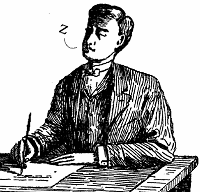 Here’s an interesting piece by Neil Levy from a few months back, on Does Consciousness Matter? (I only came across it because of its nomination for a 3QD prize). Actually the topic is a little narrower than the title suggests; it asks whether consciousness is essential for free will and moral responsibility (it being assumed that the two are different facets of the same thing – I’m comfortable with that, but some might challenge it). Neil notes that people typically suppose Libet’s findings – which suggest our decisions are made before we are aware of them – make free will impossible.
Here’s an interesting piece by Neil Levy from a few months back, on Does Consciousness Matter? (I only came across it because of its nomination for a 3QD prize). Actually the topic is a little narrower than the title suggests; it asks whether consciousness is essential for free will and moral responsibility (it being assumed that the two are different facets of the same thing – I’m comfortable with that, but some might challenge it). Neil notes that people typically suppose Libet’s findings – which suggest our decisions are made before we are aware of them – make free will impossible.
Neil is not actually all that worried by Libet: the impulses from the event of intention formation ought to be registered later than the event itself in any case, he says; so Libet’s results are exactly what we should have expected. Again, I’m inclined to agree: making a conscious decision is one thing; the second-order business of being conscious of that conscious decision naturally follows slightly later. (Some, of course, would take a very different view here too; some indeed would say that the second-order awareness is actually what constitutes consciousness.)
Neil particularly addresses two arguments. One says that consciousness is important because only those objectives that are consciously entertained reflect the quality of my will; if I’m not aware that I’m hitting you, I can’t be morally responsible for the blows. Neil feels this is a question-begging response which just assumes that conscious awareness is essential; I think he’s perhaps a bit over-critical, but of course if we can get a more fully-worked answer, so much the better.
He prefers a slightly different argument which says that factors we were not conscious of cannot influence our deliberations about some act, and hence we can only be held responsible for acts consciously chosen. George Sher, it seems, rejected this argument on the grounds that our actions are influenced by unconscious factors; but Neil rejects this, saying that although unconscious factors certainly influence out behaviour, we have no opportunity to consider them, which is the critical point.
Personally, I would say that agency is inherently a conscious matter because it requires intentionality. In order to form an intention we have to hold in mind (in some sense) an objective, and that requires intentionality. Original intentionality is unique to consciousness – in fact you could argue that it’s constitutive of consciousness if you believe all consciousness is consciousness of something – though I myself I wouldn’t go quite so far.
But what about those unconscious factors? Subconscious factors would seem to possess intentionality as well as conscious ones, if Freud is to be believed: I don’t see how I could hold a subconscious desire to kill my father and marry my mother without those desires being about my parents. Neil would argue that this isn’t relevant because we can’t endorse, question or reject motives outside consciousness – but how does he know that? If there’s unconscious endorsement, questioning and so on going on, he wouldn’t know, would he? It could be that the unconscious plays Hyde to the Jekyll of conscious thought, with plans and projects that are in its own terms no less complex or rational than conscious ones.
I think Neil is right: but it doesn’t seem securely proved in the way he was hoping for. The unconscious part of our minds never has chance to set down an explanation of its behaviour, after all: it could still in principle be the case that conscious rationalising is privileged in the literature and in ordinary discourse mainly because it’s the conscious part of the brain that does the talking and writes the blogs…
